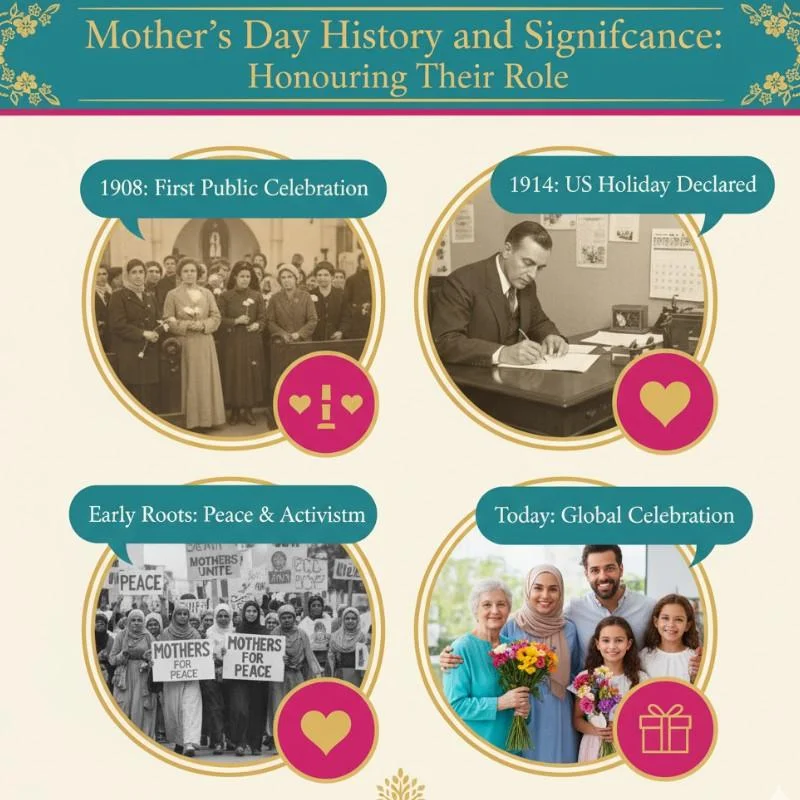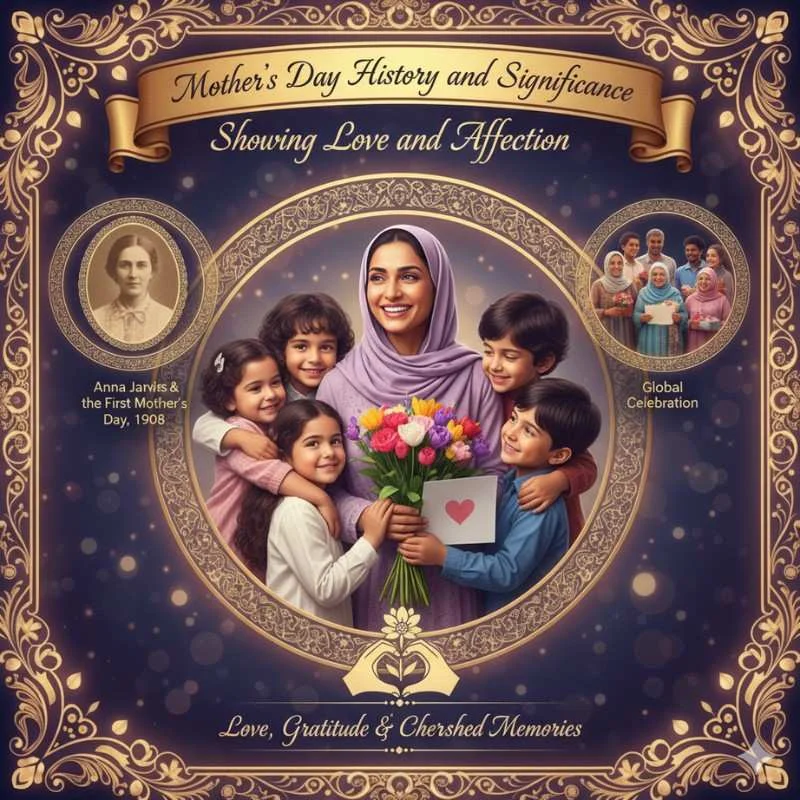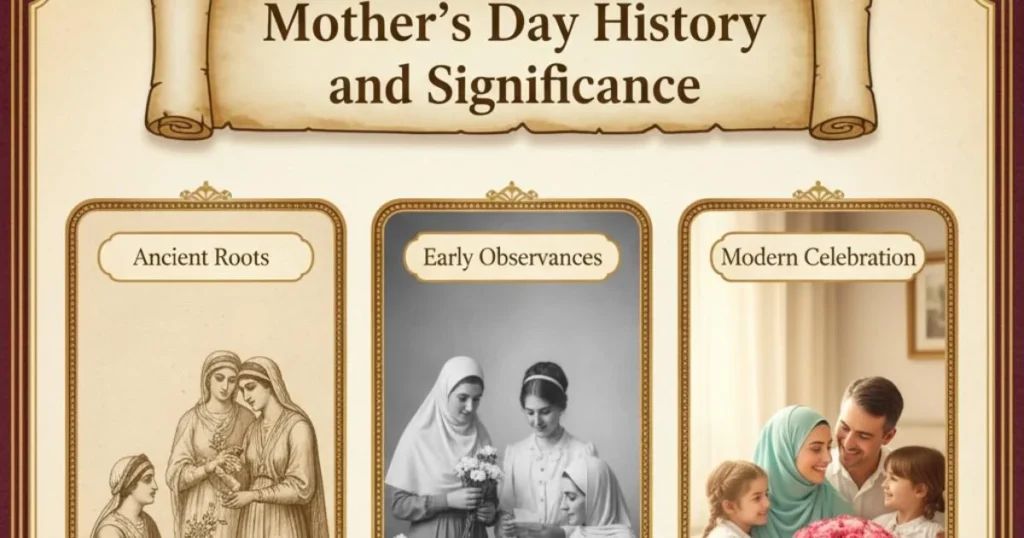Ever wondered why we celebrate Mother’s Day every year and what makes it so special? It’s more than just flowers, cards, or breakfast in bed — it’s a heartfelt tribute to the women who give us endless love, care, and strength. The history and significance of Mother’s Day go back over a hundred years, honouring mothers for their sacrifices and the irreplaceable role they play in shaping families and the world.
From ancient traditions to modern celebrations, Mother’s Day reminds us to pause and say “thank you” — not just with gifts but with genuine appreciation. Whether you’re spending time with your mom, sending a message, or simply remembering her love, this day connects us all through one universal emotion — gratitude. Let’s dive into the beautiful story behind Mother’s Day and why it continues to hold such deep meaning today.
Mother’s Day History and Significance: Expressing Gratitude
- Mother’s Day is a time to slow down and appreciate the countless ways mothers make life brighter. Their love often goes unnoticed, yet it shapes who we become. Expressing gratitude reminds them that every little act of care truly matters.
- Saying “thank you” may seem small, but it holds deep meaning. It’s a moment to honor years of patience, sacrifice, and sleepless nights. This simple gesture lets mothers know their devotion never goes unseen.
- Gratitude isn’t always about grand gifts or gestures; it’s about heartfelt recognition. A sincere hug, a handwritten note, or shared laughter can speak volumes. Thoughtful gestures never fade — even simple gifts can speak volumes. For more inspiration, see The Ultimate Guide to Farewell Gifts and discover ideas that express deep appreciation. These moments create emotional warmth that lasts far beyond the day itself.
- Expressing gratitude connects generations through love and appreciation. Children learn the value of kindness by watching how their parents give thanks. This shared awareness strengthens family bonds and builds lasting respect.
- Each Mother’s Day is a reminder to celebrate more than just a single day—it’s about lifelong appreciation. When we express thankfulness, we give back emotionally to the women who’ve given us everything. It’s a cycle of love and acknowledgment.
- True gratitude goes beyond words; it’s reflected through actions. Helping out, spending time, or simply listening shows genuine care. These everyday gestures are the most powerful way to say, “You’re valued.”
- History shows that gratitude has always been at the heart of Mother’s Day celebrations. From ancient goddess festivals to modern traditions, the message stays the same—honor those who nurture life with love and grace.
- Expressing gratitude is not just an act; it’s an emotion that uplifts both the giver and receiver. When we appreciate our mothers, we create joy that radiates throughout the family. It’s love in its purest and most timeless form.
Mother’s Day History and Significance: Honouring Their Role
- Mothers play a role no one else can fill. From the moment we’re born, they guide us with patience and unconditional love. Their quiet sacrifices often go unnoticed, yet they shape who we become in every way.
- Honoring mothers on this day is a way to say, “We see you.” It’s about recognizing the strength they carry through every challenge. Their nurturing spirit builds the foundation of every home and every heart.
- Through history, mothers have been the backbone of families and communities. They teach values, kindness, and resilience that echo through generations. Mother’s Day celebrates this powerful and timeless influence.
- Showing appreciation on this special day gives mothers the recognition they truly deserve. It reminds us that their daily acts of care are not small — they are the essence of love itself.
- The role of a mother extends far beyond raising children. She inspires, supports, and uplifts everyone around her. Celebrating this day honors that endless circle of compassion and strength.
- Every gesture — a hug, a smile, a simple thank-you — matters deeply to a mother. These moments remind her that her love makes a difference every single day. That’s what Mother’s Day truly stands for.
- Honoring mothers also means acknowledging their wisdom and guidance. Their words often become the lessons we live by, helping us make the right choices in life. Their presence is our greatest comfort.
- This celebration reminds us to pause and appreciate the women who shape our world. By honoring their role, we honor love, resilience, and humanity itself — the very heart of what Mother’s Day represents.

Mother’s Day History and Significance: Strengthening Bonds
- Mother’s Day creates a perfect moment for families to come together and reconnect. It’s a gentle reminder to slow down and appreciate the love that often goes unspoken. Sharing a meal or simply spending time together builds memories that last forever.
- Small gestures can make a big difference in strengthening the connection between mothers and children. Writing a heartfelt note or making a handmade card can express feelings that words sometimes can’t. These simple acts nurture emotional closeness and trust.
- Celebrating Mother’s Day isn’t just about gifts; it’s about togetherness. Sitting beside your mom, listening to her stories, and sharing laughter deepen your understanding of one another. Just like Eid brings families together through love and gratitude, Mother’s Day strengthens family ties too. Explore Heartfelt Eid Wishes for more ways to share warmth and affection. These moments of warmth keep relationships strong through every stage of life.
- When families celebrate Mother’s Day together, they honor a bond that stands the test of time. Every hug, smile, and shared conversation becomes part of a loving legacy. It’s these little things that turn ordinary days into unforgettable memories.
- Distance can never weaken the love between a mother and child. Even a quick video call or message on Mother’s Day can make her heart light up with joy. Staying connected, no matter where you are, keeps that precious bond alive.
- Mother’s Day traditions strengthen family ties across generations. Grandmothers, mothers, and children celebrating together create a beautiful circle of love and respect. These celebrations remind everyone how family values continue to unite hearts.
- Sharing gratitude openly on Mother’s Day brings families emotionally closer. Expressing appreciation builds empathy and understanding, which are essential for lifelong bonds. It’s not the size of the celebration that matters, but the sincerity behind it.
- Every Mother’s Day reminds us that love grows stronger when it’s shared. Taking the time to appreciate and care for one another deepens emotional roots. This day teaches that true connection is built through love, presence, and kindness.
Mother’s Day History and Significance: Showing Love and Affection
- Love is at the heart of every Mother’s Day celebration. It’s a time when simple gestures — a smile, a hug, or a kind word — mean more than grand gifts. A single rose can say more than a thousand words. If you’re sharing your love online, these Creative Rose Day Captions can help express what’s in your heart this Mother’s Day. This day reminds us that affection doesn’t need to be expensive to be genuine.
- Through the years, Mother’s Day has become a moment to express heartfelt emotions. Whether through handmade cards or shared memories, showing love makes mothers feel truly seen and appreciated. It’s about celebrating their presence, not just their role.
- Acts of love on this day strengthen the invisible bond between mothers and children. Even a short phone call or message can fill a heart with joy. These small efforts remind mothers that their care never goes unnoticed.
- Affection on Mother’s Day comes in many forms — from cooking a favorite meal to spending a quiet evening together. It’s the warmth of time shared that creates lasting memories. Each thoughtful act says, “You matter more than words can say.”
- In today’s busy world, taking time to show love on Mother’s Day feels even more precious. It’s a pause from routines to focus on what truly counts — family and connection. A few moments of attention can light up her entire day.
- Children of all ages find unique ways to express love on this special occasion. Some give flowers, others write letters, and some simply sit beside their moms, sharing stories. Love comes in many forms — romantic or maternal. For a touch of creativity, browse Captions for Lovebirds That Capture True Love and get inspired to express affection beautifully. Every expression carries the same heartfelt message — gratitude and affection.
- This day reminds us that love doesn’t fade with time; it grows stronger with every shared experience. The significance of Mother’s Day lies in nurturing that love and expressing it openly. A simple “thank you” can mean the world.
- Ultimately, Mother’s Day celebrates the beauty of unconditional love — pure, patient, and endless. Showing affection isn’t about perfection but presence. When we take a moment to cherish our mothers, we honor love in its truest form.

Mother’s Day History and Significance: Boosting Emotional Well-being
- Mother’s Day plays a powerful role in uplifting emotions by making mothers feel seen, valued, and appreciated. Small gestures of love, whether a hug or a heartfelt note, remind them of their importance in our lives. This emotional connection strengthens happiness and inner peace.
- Celebrating this special day helps mothers relax and feel cherished after months of hard work and care. It’s a moment when they can step back, smile, and enjoy the love coming their way. Simple acts of kindness often leave the biggest impact on their hearts.
- Acknowledging a mother’s efforts can boost her confidence and overall mood. When families express gratitude openly, it reinforces her sense of purpose and belonging. Emotional appreciation creates joy that lasts far beyond one day.
- Even a simple “thank you” on Mother’s Day can brighten her entire week. The recognition brings emotional warmth that words alone can’t describe. Feeling loved and respected helps mothers recharge emotionally and mentally.
- Mother’s Day also offers emotional healing by bridging gaps between family members. It encourages open conversations, forgiveness, and renewed bonds. This togetherness fills the heart with comfort and peace.
- When children take time to express love, mothers experience genuine emotional fulfillment. It reminds them that their efforts matter and their sacrifices are remembered. Such moments strengthen family harmony and mutual trust.
- The celebration of Mother’s Day creates lasting memories that nurture emotional resilience. Shared laughter, family meals, or small surprises add layers of happiness to everyday life. These joyful memories become emotional anchors for the future.
- Ultimately, Mother’s Day reminds everyone that love, care, and appreciation are the foundation of emotional well-being. By celebrating this day sincerely, we help mothers feel deeply valued and emotionally balanced — a feeling that truly lasts all year.
Mother’s Day History and Significance: Tradition and Culture
- In many cultures, Mother’s Day is a beautiful blend of love and tradition. Families come together to celebrate the women who nurture and guide them. The day symbolizes appreciation, unity, and heartfelt gratitude.
- Across the world, traditions vary — from sharing home-cooked meals to writing loving letters. Some light candles, others offer flowers, but the emotion stays the same. It’s all about expressing love and respect in personal ways.
- In ancient times, celebrations honoring mothers were linked to goddesses of fertility and nature. Over time, these rituals evolved into the modern Mother’s Day we know today. It carries forward centuries of cultural appreciation. Just like Earth Day History: 60+ Powerful Facts About Change the World reminds us to care for our planet, Mother’s Day celebrates the nurturing spirit that sustains families and generations.
- Different countries mark this occasion with unique customs that reflect their heritage. In Japan, children gift red carnations to show admiration. In Mexico, people sing traditional songs dedicated to mothers.
- In India, Mother’s Day combines western influence with deep-rooted family values. It’s a time when families gather, cook special dishes, and express gratitude through heartfelt gestures. The bond feels both sacred and joyful.
- Cultural expressions of Mother’s Day highlight the shared human value of honouring care and compassion.ust as cultures celebrate motherhood in diverse ways, art also reflects human emotion. Uncovering the Rich History and Diverse Uses of Ceramics beautifully showcases how tradition and creativity intertwine. Whether grand or simple, each celebration reinforces the love that connects generations.
- This day also encourages the younger generation to value their roots. By celebrating traditions, families pass down emotional connections that strengthen their cultural identity.
- Ultimately, Mother’s Day traditions remind us that love transcends borders. Each culture adds its own flavor, yet the message remains timeless — to honor the women who give life, love, and endless care.
Modern Ways to Celebrate Mother’s Day
- Technology makes celebrating easier than ever. You can surprise your mom with a heartfelt video message, virtual brunch, or a live online concert dedicated to her. It’s a creative way to stay connected, even from miles away.
- Personalised gifts are trending because they feel thoughtful and unique. From engraved jewelry to custom photo books, these keepsakes remind moms how special they are every time they see them. If you love giving meaningful presents, explore The Art of Gift-Giving: Curating the Ideal Gift Box — it’s full of creative ways to make your Mother’s Day gifts extra special.
- Experience-based gifts are replacing traditional presents. Plan a spa day, weekend getaway, or fun cooking class to make memories together instead of just exchanging items.
- Handwritten letters are making a comeback. Writing a short note about what your mom means to you can melt her heart more than any store-bought gift ever could.
- Eco-friendly celebrations are gaining popularity. Planting a tree or gifting reusable home items shows love for your mom while caring for the planet she nurtured you on.
- Breakfast in bed never goes out of style. Prepare her favourite meal with a simple touch of love — pancakes, coffee, and flowers can make her morning unforgettable.
- Social media shootouts are a modern way to publicly honor mothers. Sharing photos and memories online can spread positivity and inspire others to appreciate their mothers, too. Planning to share your Mother’s Day brunch online? Don’t miss these Funny and Relatable Foodie Captions to make your celebration posts even more fun.
- Acts of service often mean the most. Take over her chores, cook dinner, or plan a family movie night — small gestures that show your gratitude in the sweetest way possible.

The Global Impact of Mother’s Day Celebrations
- Mother’s Day is celebrated in more than 100 countries, each adding its unique touch to the occasion. From handmade cards to heartfelt dinners, every culture finds its own way to say thank you. This worldwide celebration highlights how love for mothers unites people across borders.
- In the United States, Mother’s Day started as a simple tribute and soon became a national holiday. Its message of gratitude spread quickly, inspiring many other nations to honor motherhood. Today, it stands as a global reminder of care, kindness, and appreciation.
- Across Asia, families celebrate with traditions that reflect deep respect and devotion. In countries like Japan and India, gifts, flowers, and family gatherings mark the day. These gestures strengthen family bonds and express timeless love for mothers.
- European countries bring their own charm to the celebration, often blending history and culture. Many communities attend church services or organize special family meals. Through these traditions, Europe celebrates motherhood as a symbol of compassion and unity.
- African nations also embrace Mother’s Day in meaningful ways, combining modern customs with local culture. Festivities often include songs, dances, and family gatherings that honor women’s strength. It’s a day that celebrates nurturing and resilience in every mother’s heart.
- In Latin America, Mother’s Day feels like a festival of joy and color. Families gather, music fills the air, and mothers are showered with affection and gifts. The celebrations capture the spirit of love and gratitude that defines the region.
- In the Middle East, Mother’s Day is gaining popularity as societies recognize women’s powerful roles. Acts of respect and appreciation reflect deep cultural values of family and care. The celebration bridges generations and inspires kindness across communities.
- Globally, Mother’s Day has become more than just a holiday — it’s a shared expression of humanity. Despite differences in traditions, the message remains the same: mothers deserve honor, love, and gratitude. This worldwide unity proves that appreciation knows no boundaries.
FAQs
What is the history of Mother’s Day and how did it begin?
Mother’s Day began in the early 1900s when Anna Jarvis started a movement to honor her mother’s compassion. The tradition soon spread worldwide, celebrating mothers everywhere.
Why is Mother’s Day celebrated around the world?
Mother’s Day is celebrated globally to express gratitude, love, and respect for mothers. It highlights their sacrifices and the vital role they play in shaping families and societies.
What is the true meaning and significance of Mother’s Day?
The significance of Mother’s Day lies in recognizing a mother’s love, patience, and strength. It reminds us to appreciate their endless support and selfless contributions.
How did the idea of Mother’s Day spread across different countries?
The concept of Mother’s Day spread from the United States to other nations through shared values of love and family. Each culture added its own traditions, keeping the emotion universal.
How can we celebrate Mother’s Day meaningfully today?
We can celebrate by spending time with our mothers, writing heartfelt messages, or giving thoughtful gifts. Small acts of kindness often mean more than expensive presents.
Conclusion
The Mother’s Day History and Significance remind us that celebrating mothers is more than just a yearly event — it’s a heartfelt expression of gratitude and love. From Anna Jarvis’s original vision to global traditions, this day connects us through appreciation and compassion.
Honouring mothers strengthens emotional bonds, uplifts families, and celebrates the unconditional care that shapes our lives. The history and significance of Mother’s Day continue to inspire generations to express love, kindness, and respect. No matter where we live, Mother’s Day remains a timeless tribute to the women whose love truly makes the world brighter.


